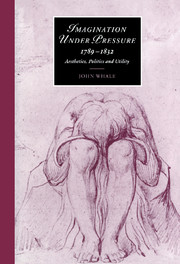Book contents
- Frontmatter
- Contents
- Acknowledgements
- Introduction
- Part I IMAGINATION AND REVOLUTION
- Part II IMAGINATION AND UTILITY
- 4 Hazlitt and the limits of the sympathetic imagination
- 5 Cobbett's imaginary landscape
- 6 Coleridge and the afterlife of imagination
- Afterword
- Notes
- Bibliography
- Index
- CAMBRIDGE STUDIES IN ROMANTICISM
6 - Coleridge and the afterlife of imagination
Published online by Cambridge University Press: 22 September 2009
- Frontmatter
- Contents
- Acknowledgements
- Introduction
- Part I IMAGINATION AND REVOLUTION
- Part II IMAGINATION AND UTILITY
- 4 Hazlitt and the limits of the sympathetic imagination
- 5 Cobbett's imaginary landscape
- 6 Coleridge and the afterlife of imagination
- Afterword
- Notes
- Bibliography
- Index
- CAMBRIDGE STUDIES IN ROMANTICISM
Summary
The imagination is the distinguishing characteristic of man as a progressive being; and I repeat that it ought to be carefully guided and strengthened as the indispensable means and instrument of continued amelioration and refinement. Men of genius and goodness are generally restless in their minds in the present, and this, because they are by a law of their nature unremittingly regarding themselves in the future, and contemplating the possible of moral and intellectual advance towards perfection. Thus we live by hope and faith; thus we are for the most part able to realize what we will, and thus we accomplish the end of our being. The contemplation of futurity inspires humility of soul in our judgement of the present.
In his 1818 lecture on the subject of European literature Coleridge confidently announces the pride of place which should be afforded to imagination in the education of children. In this context the faculty is firmly linked to ideas of individual, historical, and social progress. Seen from this optimistic progressivist perspective, imagination is the mainstay, the primary and central principle onto which other faculties and their methodologies can fruitfully be grafted. The very nature of the subjectivity produced by imagination is thus prospective and propulsive, a selfhood based, as Coleridge makes clear, on faith and hope.
- Type
- Chapter
- Information
- Imagination under Pressure, 1789–1832Aesthetics, Politics and Utility, pp. 166 - 193Publisher: Cambridge University PressPrint publication year: 2000



